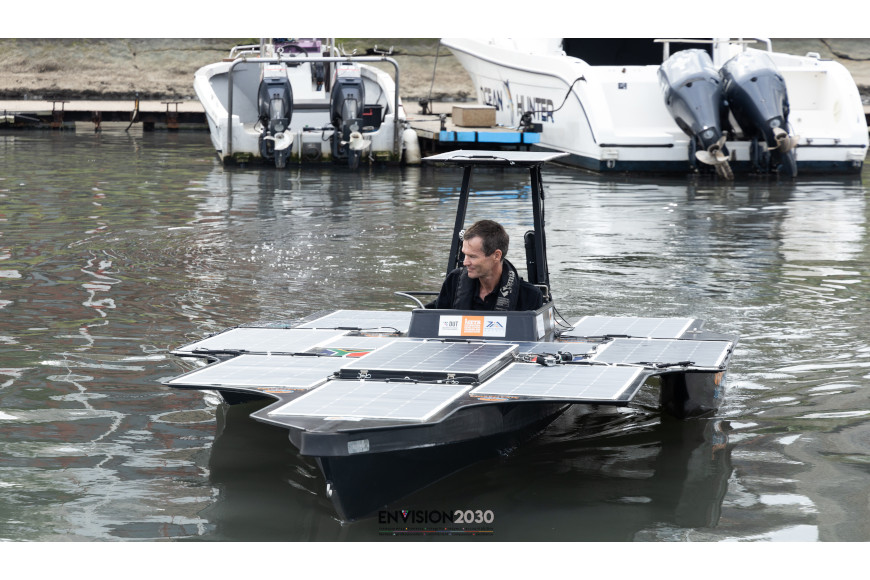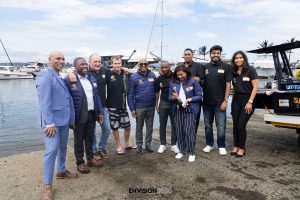The Durban University of Technology (DUT) in collaboration with the Energy and Water Sector Education Training Authority (EWSETA) officially launched one of its greatest innovations, the Siyahamba Solar Boat. Distinguished guests gathered at the Point Yacht Club, Durban Harbour on Friday, 26 April 2024, to witness the historical moment as DUT’s Siyahamba Solar Boat is a ‘first of its kind’ in Africa.
The Siyahamba Solar Boat is set to compete internationally in the Monaco Energy Boat Challenge (MEBC) in Europe, in July 2024. DUT was selected as one of the 15 finalists out of the 120 global entries for this prestigious competition.
This solar-powered boat was designed and built by DUT students and staff from the DUT Energy Technology Station known as the KZN Industrial Energy Efficient Training and Resource Centre (IEETR). It has an overall length of 5.5 metres, width of 2.4 metres and height of 1.2 metres. The main body is made from a carbon fibre composite structure reinforced with aluminium. The estimated overall weight is 90 kilogrammes. It has a Photovoltaic (PV) array of 1.3 Kilowatts to charge a 1.46 Kilowatt hour battery bank, in order to power its 4 Kilowatt Torqeedo electric motor.
The Programme Director, Mr Alan Khan, Senior Director of Corporate Affairs at DUT revealed that DUT was the only university in South Africa and on the African continent that will be participating in the Monaco Energy Boat Challenge. He revealed that the Siyahamba Solar Boat was named after the Springbok captain, Siya Kolisi, after South Africa won the Rugby World Cup in 2019. He indicated that the work on the boat commenced in 2018 and that the boat will showcase DUT’s excellence on a global stage.
In his welcome remarks the Deputy Vice-Chancellor: Research, Innovation and Engagement at DUT, Professor Fulufhelo Nemavhola, said the Siyahamba Solar Boat was more than a boat, it was a symbol of DUT’s impact. He indicated that it was aligned to DUT’s ENVISION2030 strategy, which aspires to produce adaptive graduates who will make a positive impact in society and improve lives and livelihoods.
“It is symbol of a sustainable DUT, it shows the world what our students are capable of. Let us sail on the wave of innovation and let us indeed celebrate the Siyahamba Solar Boat,” said Prof Nemavhola.
DUT’s Professor Ian Lazarus, the Siyahamba Solar Boat Project Leader and KZN Industrial Energy Efficient Training and Resource Centre Manager gave a brief history of the Siyahamba Solar Boat and the road to Monaco.
He acknowledged the team behind this remarkable innovation in Africa, with special mention to the boat pilot, Mr Steve Ellis, a world renowned skipper who has been involved in the research and design of the boat from the very beginning. Prof Lazarus revealed that Ellis has a wealth of knowledge of the boating industry and they are confident that he will lead the team to victory at the MEBC in Monaco. He also extended his gratitude to Mr Daanish Meeran, (a DUT Alumnus and former DUT Staff Member), who designed the boat. Prof Lazarus expressed his gratitude to the EWSETA for funding the project and making their dream a reality.
“This project exposed the team members to a high level of creativity and engineering freedom, which gave them the opportunity to build something unique. The MEBC was established to promote renewable energy and innovation as alternatives to keep our oceans and environment clean. The Siyahamba Solar Boat project creates an awareness in our society, nationally and internally, as it showcases an alternative mode of transport using innovative renewable energy technologies. Our focus is on more affordable transport initiatives, especially in eco-sensitive areas of the world, where the sun is abundant, and fuel is expensive and harmful to the ecology. The application of renewable energy to the boating industry champions the cause for a cleaner and more efficient industry and environment,” stated Prof Lazarus.
Ms Candice Moodley, EWSETA Corporate Service Executive gave a message of support expressing their excitement in partnering with DUT on this ground-breaking project, as partners in their journey to sustainable energy solutions and taking skills development in South Africa in a new direction.
“As we unveil the Siyahamba Solar Boat, we also unveil the symbol of innovation and determination clearly from the team, who started the project in 2020 during the hectic time of COVID-19. They have showcased the unwavering spirit of South Africa and indeed the African exhilarant. Being selected as one of the 15 finalists among 120 entries worldwide, inspires us all. It showcases the talent and potential that exists within the higher education institutions in South Africa,” said Moodley.
In closing, the Executive Dean in the Faculty of Applied Sciences, Professor Suren Singh, thanked all the distinguished guests for gracing the launch, which marked a significant milestone in sustainable transportation. He thanked the KZN IEETR for coming up with this amazing project that will showcase DUT’s innovativeness on a global scale and its contribution towards the future of sustainable energy.
The DUT Vice-Chancellor and Principal, Professor Thandwa Mthembu, along with the KZN IEETER and EWSETA then led the guests to the big reveal of the Siyahamba Solar Boat and they witnessed the solar boat pilot, Steve Ellis, sailing Siyahamba in the Durban Harbour.
Pictured: Siyahamba Solar Boat pilot, Steve Ellis steering the boat at the launch.
Photographer: Mnqobi Ngobese
Simangele Zuma




